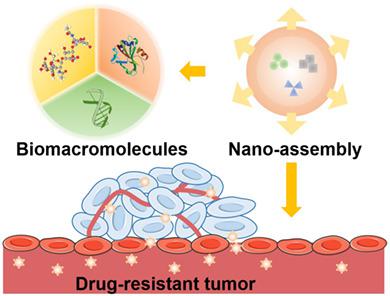当前位置:
X-MOL 学术
›
Polym. Int.
›
论文详情
Our official English website, www.x-mol.net, welcomes your feedback! (Note: you will need to create a separate account there.)
Nano-assemblies based on biomacromolecules to overcome cancer drug resistance
Polymer International ( IF 3.2 ) Pub Date : 2021-10-07 , DOI: 10.1002/pi.6310 Meng Cheng 1 , Hongjing Dou 1
Polymer International ( IF 3.2 ) Pub Date : 2021-10-07 , DOI: 10.1002/pi.6310 Meng Cheng 1 , Hongjing Dou 1
Affiliation

|
Overcoming tumor resistance is one of the major challenges encountered in cancer treatment. With the rapid development of nanotechnology in recent years, nano-assemblies have become promising candidates due to their strong potential to overcome the drug resistance of tumors. They have a high degree of adaptability, including size and composition regulation, surface versatility and the possibility of combining multiple therapeutic approaches through a single nanoparticle platform. Among multiple self-assembled component materials, biomacromolecules have attracted ever growing attention because of their unique molecular structures, natural biocompatibility and multifunctional properties. Herein, various mechanisms of nano-assembly utilization overcoming cancer drug resistance are first summarized, and then the roles and research progress of typical biomacromolecules (such as polysaccharides, proteins and nucleic acids) in nano-assemblies capable of overcoming cancer drug resistance are described. Finally, the potential challenges and prospects of the clinical application of biomacromolecule-based nano-assemblies are analyzed and discussed. © 2021 Society of Industrial Chemistry.
中文翻译:

基于生物大分子的纳米组件克服癌症耐药性
克服肿瘤耐药性是癌症治疗中遇到的主要挑战之一。近年来,随着纳米技术的快速发展,纳米组件因其强大的克服肿瘤耐药性的潜力而成为有希望的候选者。它们具有高度的适应性,包括尺寸和成分调节、表面多功能性以及通过单个纳米颗粒平台组合多种治疗方法的可能性。在多种自组装组分材料中,生物大分子因其独特的分子结构、天然的生物相容性和多功能特性而受到越来越多的关注。在此,首先总结了纳米组装利用克服癌症耐药性的各种机制,然后介绍了典型生物大分子(如多糖、蛋白质和核酸)在能够克服癌症耐药性的纳米组装体中的作用和研究进展。最后,分析和讨论了生物大分子纳米组件在临床应用中的潜在挑战和前景。© 2021 工业化学学会。
更新日期:2021-10-07
中文翻译:

基于生物大分子的纳米组件克服癌症耐药性
克服肿瘤耐药性是癌症治疗中遇到的主要挑战之一。近年来,随着纳米技术的快速发展,纳米组件因其强大的克服肿瘤耐药性的潜力而成为有希望的候选者。它们具有高度的适应性,包括尺寸和成分调节、表面多功能性以及通过单个纳米颗粒平台组合多种治疗方法的可能性。在多种自组装组分材料中,生物大分子因其独特的分子结构、天然的生物相容性和多功能特性而受到越来越多的关注。在此,首先总结了纳米组装利用克服癌症耐药性的各种机制,然后介绍了典型生物大分子(如多糖、蛋白质和核酸)在能够克服癌症耐药性的纳米组装体中的作用和研究进展。最后,分析和讨论了生物大分子纳米组件在临床应用中的潜在挑战和前景。© 2021 工业化学学会。



























 京公网安备 11010802027423号
京公网安备 11010802027423号